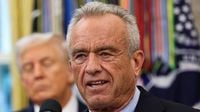On October 10, 2025, a new storm erupted at the intersection of science, politics, and public health in the United States. Robert F. Kennedy Jr., the current Secretary of Health under President Donald Trump, reignited controversy by making a series of claims linking common medical practices and over-the-counter drugs to autism—claims that experts say are not only unproven, but potentially dangerous.
During a high-profile Cabinet meeting with President Trump, Kennedy asserted, "There's two studies that show children who are circumcised early have double the rate of autism. It's highly likely because they're given Tylenol." This statement, as reported by The Economic Times, quickly spread across social media, drawing both support and sharp criticism from across the political spectrum.
But the science tells a different story. The most widely cited research supporting Kennedy's circumcision theory was published by Danish researchers in 2015. Yet, as David Mandell, a psychiatrist at the University of Pennsylvania's Perelman School of Medicine, told AFP, the study was "riddled with flaws." Mandell pointed out that the research focused on a small group of Muslim boys circumcised in hospitals—a setting that is not the norm in their culture, where circumcisions are typically performed at home. "Because those children were hospitalized, it was likely they were otherwise medically compromised," Mandell explained, suggesting that this could account for higher rates of neurodevelopmental disorders, including autism, in the sample.
Adding to the skepticism, Helen Tager-Flusberg, a professor at Boston University and an autism expert, told AFP, "None of the studies have shown that giving Tylenol to babies is linked to a higher risk for autism once you can control for all the confounding variables." Furthermore, a rigorous analysis published in JAMA last year, which used siblings as controls, found no link at all between acetaminophen (the active ingredient in Tylenol) and autism.
Despite these facts, Kennedy doubled down, suggesting that critics of his theory were motivated by animosity toward President Trump. As reported by Straight Arrow News, he acknowledged the lack of medical evidence for his claims but maintained his position, even making the anatomically incorrect statement that a pregnant woman was taking Tylenol "with a baby in her placenta." This misstep only fueled further concern among medical professionals.
Medical associations, meanwhile, continue to advise pregnant women to take pain medication such as acetaminophen in moderation when necessary—contrary to President Trump's advice to "tough it out." The consensus remains that, while a handful of studies have explored a possible association between acetaminophen use during pregnancy and autism, no causal link has ever been proven.
But Kennedy's controversial approach to health policy extends beyond Tylenol and circumcision. He has hired David Geier, a figure disciplined for practicing medicine without a license and for testing unproven drugs on autistic children, to investigate alleged links between vaccines and autism. This connection, however, has already been debunked by dozens of rigorous studies, as noted by The Economic Times.
Public confidence in federal health leadership appears to be suffering as a result of such controversies. A recent poll conducted by KFF and reported by Straight Arrow News found that 59% of Democrats called President Trump's statements about acetaminophen "definitely false," while 56% of Republicans viewed them as true or probably true. The same poll revealed that 59% of respondents disapprove of Kennedy's appointment as Secretary of Health. Ashley Kirzinger, KFF's director of survey methodology, highlighted a 24-point drop in trust among Democrats in the CDC's vaccine guidance over the past two years—a decline she attributes to growing political polarization around health information.
The polarization is further fueled by Kennedy's recent pivot to questioning the effectiveness of vaccines themselves. In a September 29 Instagram post, Kennedy claimed that vaccines were not responsible for the dramatic decline in infectious disease deaths in the United States over the twentieth century. Instead, he credited improvements in sanitation and nutrition.
Yet, as experts Ezekiel J. Emanuel, Abe G. Baker-Butler, and Michael T. Osterholm wrote in STAT on October 10, 2025, Kennedy's narrative is both incomplete and misleading. While it's true that sanitation and nutrition played a major role in increasing life expectancy from 47 years in 1900 to nearly 69 years by 1953, the leap to today's nearly 80-year average is largely due to vaccines and modern medical advances. "Vaccines have not only reduced mortality but also morbidity, and in many cases, they have even saved money," the experts wrote.
They provided compelling examples: The polio vaccine, introduced in the 1950s, has saved hundreds of thousands from paralysis. In 1952, there were 58,000 polio cases and 21,000 cases of paralysis in a population of about 155 million. Today, polio paralysis is nearly eradicated in the U.S. Similarly, the introduction of vaccines for measles and Haemophilus influenzae has led to the near-elimination of related deaths and severe complications. In fact, childhood vaccines are credited by Kennedy's own department with preventing or soon to prevent 1.1 million deaths and 32 million hospitalizations among Americans born between 1994 and 2023.
Economic arguments further reinforce the case for vaccines. The experts noted that for every dollar spent on the MMR vaccine, the health care system saves over $13. Without widespread vaccination, preventable diseases like measles and chickenpox would not only return but would saddle the health care system with billions in extra costs.
Despite these facts, Kennedy continues to frame his positions as empowering individuals to make their own health choices. But as the STAT authors countered, "Individuals’ choices to refuse vaccination have huge consequences for the rest of our society." The evidence from randomized clinical trials is clear: vaccines are highly effective, safe, and essential for public health.
Medical experts and public health advocates are now sounding the alarm that Kennedy's unconventional views, amplified from the highest levels of government, could undermine decades of progress in evidence-based health policy. The stakes are high—not just for individuals, but for the health and economic well-being of the nation as a whole.
As the debate rages on, one thing is certain: the intersection of science, politics, and public trust has rarely been more contentious—or more consequential for the future of American health.


